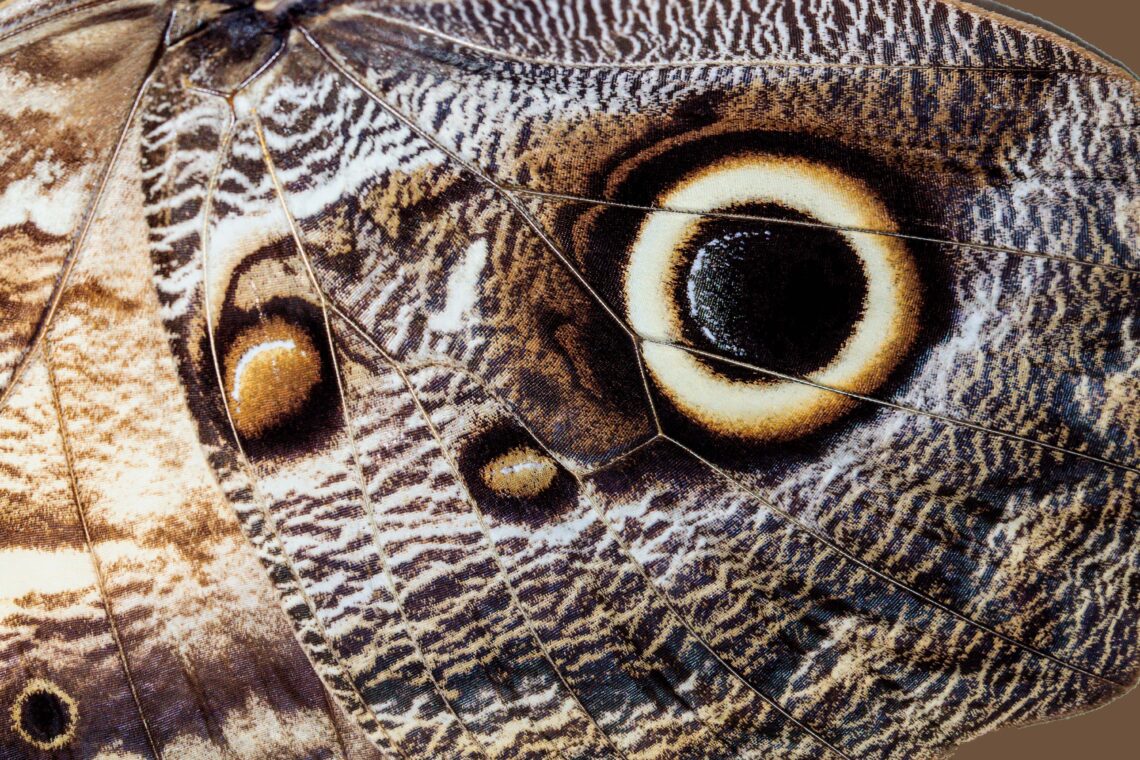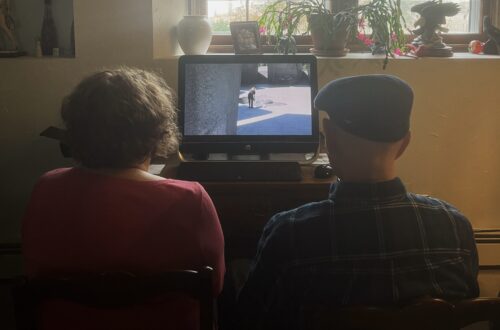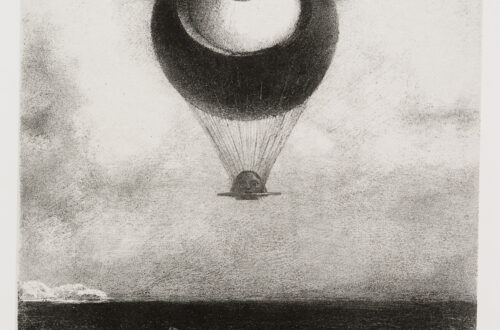
Benign Madness
by Joyce Lee
You know the insanity has always been there, hidden within the stories, secreted from the norm.
It’s there when, as a child, you sit by the lake with your younger cousins, weaving stories of sun fairies and shadow gnomes that dance on the wind-kissed water. They giggle and ask for more, and it’s just a story to them, but you see defined essences latent in the alternating sparkles and shadows, skimming the skin of your reality even as they skitter across the surface of the water, a refined actuality that soothes and satisfies, even as you know it’s illusion.
It’s there as you’re older when, while digging rocks in the spring fields, you apologize silently to the stones you root out of the damp, sucking earth. Two gray-flecked rocks bump edges—Oh, do you want to be with your love? Here—and you toss them together into the wagon, your guilt at pulling them from their home cleansed by their imagined stony joy at being reunited. It’s always with you as everywhere, every moment, life thrums from insentient objects, conflicts arising from your intrusion and ameliorated by your intervention—an eloquent opera that fills your head with pulsations unheard by others.
At first, you attribute it to imagination—after all, that’s what everyone in your family calls your odd little quirks, your non sequiturs and odd connections, but eventually you come to realize that it’s unique to you: your personal warped reality. Ultimately, with that cognizance comes the realization that this is more than a vague eccentricity, more than a shade beyond normal, a madness that exists on the periphery of your life.
It seems to be a form of balance that demands satisfaction—if you touch something with one hand, you must also touch it with the other. If you twirl in one direction, you must equalize your internal pressure by performing an equal spin going the other way. Anything countable must be in even numbers—small candies, cut-up food, steps taken across a room; something within demands this equilibrium. It’s insanity, a divergence, a madness that rules your behavior.
But it’s you, your essence, your nexus, and you realize it’s not going to go away. With that understanding comes acceptance, and a calm settles over you: you can endure. With this recognition comes the ability to mask the deviance, to take on the mantle of normalcy even as you give in to the demands of the madness.
You wonder where the eccentricity came from. Surely you weren’t born with it—as a baby, did you need to suck both thumbs equally? When you first learned to roll over, did you then feel the compulsion to roll the other way as well?
No, you enter the world pure, free, unhampered by compulsion.
Then it starts, as early as memory allows. As a child, when you are skipping rope you feel the pull to touch both feet equal times on the ground. When you twirl a few turns on the playground merry-go-round, you insist your friends push it the other way as well. Then, with precocious prescience, you realize early on that these urges are not the norm, and you learn to mask them. You somehow understand you must not vocalize your perceptions, that others won’t share or understand your interior pulls.
You know it’s all foolishness, a cruel joke, “harmless mishigoss,” as your parents dismiss it. But it grows from annoying to obsessive. Some subconscious calculator figures the number of steps from your bed to the door so that you can end with your right foot and step into the hall with your left (your left always leads). Your life becomes a pattern of left-right-left, of prescribed paradigms to be followed, the demand impressed on your subconscious.
Rituals rule your life, patterns set in from who knows what origin? Bedtime requires sing-song repetition of the words “good night,” multiples sent in unvarying pattern to your sister in the bed across the room, the need to have the last word before sleep an urgent one. Then, when your soul is soothed and content, your sister, with that sublime instinct, that capability for torture innate in siblings, makes a sound, a word, a giggle, a throat-clear after you finish your litany so you have to go through the whole thing again. She laughs with the derision of one not in the grip of compulsion. But to you it’s not funny: it’s torment.
And it’s your life.
You pray for the insanity to dissipate as you grow older, but it escalates. Rhythms, symmetry, consistencies begin to dominate your days. You become cognizant of your need to maintain a physical equality in your body’s moieties: If you touch thumb and forefinger on your right hand, your left silently cries out for equal contact; your shoelaces must be tucked neatly inside their shoes; the door entered must be the door exited, all to establish balance in your universe. This isn’t anything you think of, you just do it, but the reparation is conscious as you struggle to satisfy the urges while masking the oddity as best you can, living your life on multiple planes of the compulsive and the conscious.
Many times, whether from desperation, public necessity, or sheer exhaustion, you simply reject your anomaly as your overriding logic allows you a momentary semblance of normalcy. Some part of your brain awakens to monitor your actions so you don’t appear too daft in front of others. You can even, with a little effort, ignore an impulse, at least outwardly, knowing it will eventually go away if you can just hold out long enough for your mind to switch to some other fervent focus.
If you slip and someone comments on an oddity or an incongruous gesture, you live the joke: “Well, my grandparents were first cousins.” Still, you search your siblings and cousins for other signs of inherited madness, and find many idiosyncrasies, but none of the caliber of yours; they must hide theirs well, too—you can’t be the only one.
You don’t want these urges, but they’re there, and you have to accept them as part of your life just so you can survive. Foolish games or offhand comments become ingrained in your psyche: the childhood chant, “don’t step on a crack or you’ll break your mother’s back” becomes the rhythm of your pace (left-right-left). Of course you know your movements have nothing to do with the larger world, and if you miss a beat or step on a crack you don’t hyperventilate—you’re not that crazy. Still, you adjust your stride to begin again, automatically judging the size of the concrete slab so you can step left foot first and come out clear of the crack. It’s like a child’s game—except it’s not a game, and you’re not a child.
And you don’t want to play.
As you grow, the mania metastasizes, its fibrils reaching, their effect transposing. The narcissism of adolescence balloons within you—you know, you know, that your tiny actions affect the entire universe. If something bad happens—an accident, an illness, a damaging storm—you frantically try to recall what you did that caused it, how you somehow defied whatever or whoever it is that is overseeing your movements. You avoid wearing a new skirt you coveted because the day after you got it, your sister broke her wrist, so of course that skirt—the shift in your ruling paradigm—was the cause. Then, after a month, your mother insists you wear it and nothing bad happens, so it’s all okay. For the moment. The skirt joins the norm, and soon enough, something else will become the evil talisman.
Your shoes must line up exactly in your closet, toes level like little soldiers guarding your secret deviance. You set your stuffed animals on the bed in an unconsciously determined pattern, and your sister, in her never-ending quest to annoy you, purposely moves them, realigning the stars, teasing the gods, and you must spend time carefully readjusting the lineup. It becomes her most intense form of torture, even more than the “good night” tease. She knows it makes you crazy. You know she knows, and you know it is crazy, but you can’t help it. If your shoes and dolls are not aligned, the sun will nova, the universe will implode, and life as we know it will cease to exist. You and you alone must keep the cosmos in order to prevent disaster.
There are advantages to your compulsions, of course. Your urge to re-enter the house to check the stove or the iron several times before going somewhere occasionally results in remembering something you needed. Your urge to revise and rewrite to perfection assures excellence in your school papers, and your precise grammar and impeccable spelling earn you kudos. You become the darling of the school marching band, as you excel at the intricate patterns, never out of step, not even having to think about left-right-left because it is a built-in part of your psyche.
You marry, you have children, you are happy. The compulsions wane as your focus shifts to the care of your family, and the insanity seems to recede in your busy life, superseded by your protective instincts. Still, little curls of must are always tickling your brain. You learn to tuck your impulses within acceptable parameters, and pride yourself on finally approaching normalcy, albeit behind a thin facade.
Then something cataclysmic happens: someone dies—your friend, your mother, your husband. The tamped-down egoism resurfaces and escalates, and you tear through your mind: what did you do, not do, buy, use that you shouldn’t have? What did you do wrong? Stop it, do it, throw it out, change it, bring them back!
You know the cataclysm is all your fault; your life can’t get worse, you can’t get any more miserable. So you follow the pull, taking comfort in its soothing protection. Your mind understands that it’s not real as your rational self tells you to stop it, just stop it. Drop the multiple mantras, trim the repetitions, ignore the urges, run out one door and in another, touch something with only one hand, step out with your right! You vow you will change, but you don’t.
You can’t.
You wonder if it’s God playing you. You wonder if there even is a God, but you are afraid to commit to that idea because you are sure that if you are wrong retaliation will be swift and devastating. You wonder if God is laughing at you, pulling your marionette strings as you dance, left-right-left.
You wonder if these compulsions are felt, to varying degrees, by everyone. It occurs to you that the same need for pattern and balance must be universal, that it is logically the basis for all religious rites, is possibly the reason why your mother lit the Friday-night candles—why you still light them, even though you feel no religious fervor. You wonder whether your mother, your grandmother, your distant ancestors faced that same duress, and that maybe your need to restore equilibrium has actually been the manifestation of an ironically unbalanced spark passed down as part of the human genome.
Or is it a more universal botheration? Could it be that this irregularity is the provenance of all religions? Is this, then, the indeterminate pivot upon which the aberrant world spins on a tilted axis, the basis of all formality? More, could it be that this the root of all intolerance and hatred, the ultimate ratio that urges the purge of divergent thought? Maybe abnormal is the norm, a benign madness that compels us to codify and embrace what we can’t comprehend: love, politics, God.
That’s how your world—maybe all the world—works, and you can either fight a daily struggle, or accept it and be content. You are doomed to forever traverse the cosmic vale, always stepping off with your left, yet hoping to someday break free and leave the world with a soul cleansed and pure.
The same way you came in.

Prior to earning her MFA from Northwestern University, Joyce Becker Lee worked as a newspaper reporter, editor, theater columnist, textbook developer, and high school and college instructor of English, Writing and Theater. Her stories, features, and poetry have been published extensively in print and online, and she also writes novels, plays and film scripts, and has developed a television series based on the characters in a small-town community theater. A dedicated theater lover, she has spent a lifetime in educational, community and professional theater as a director and performer, and is the creator of seven children’s musicals. She enjoys volunteer work for civic and animal-related causes and is a busy hands-on grandmother. Her collection of short stories, Casualties, is published by Tortoise Books.




